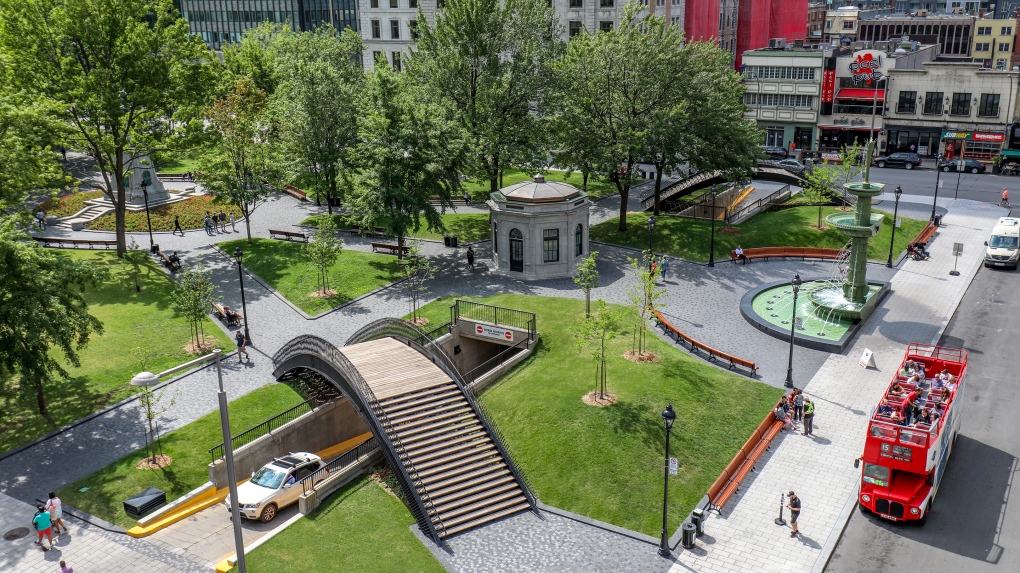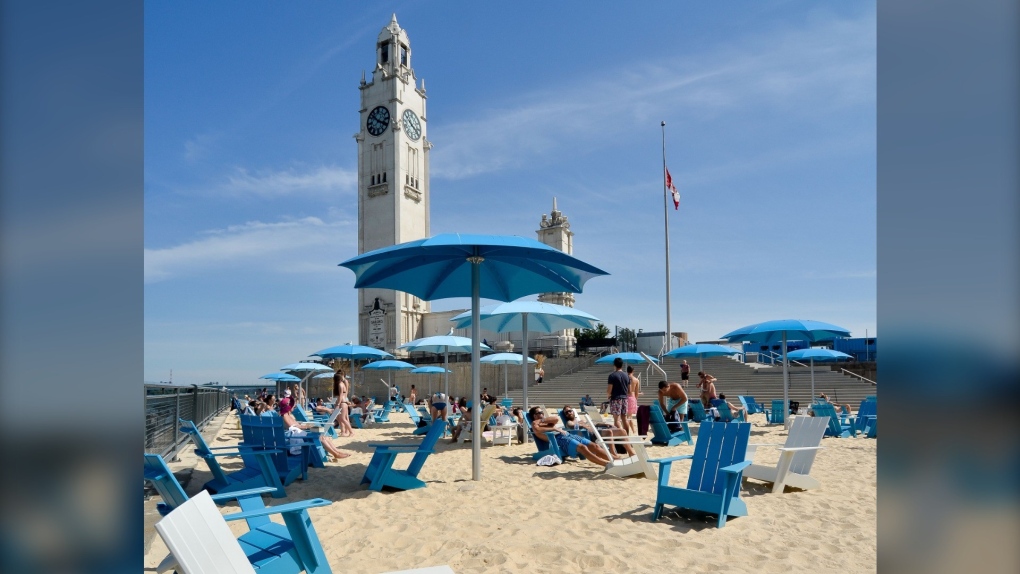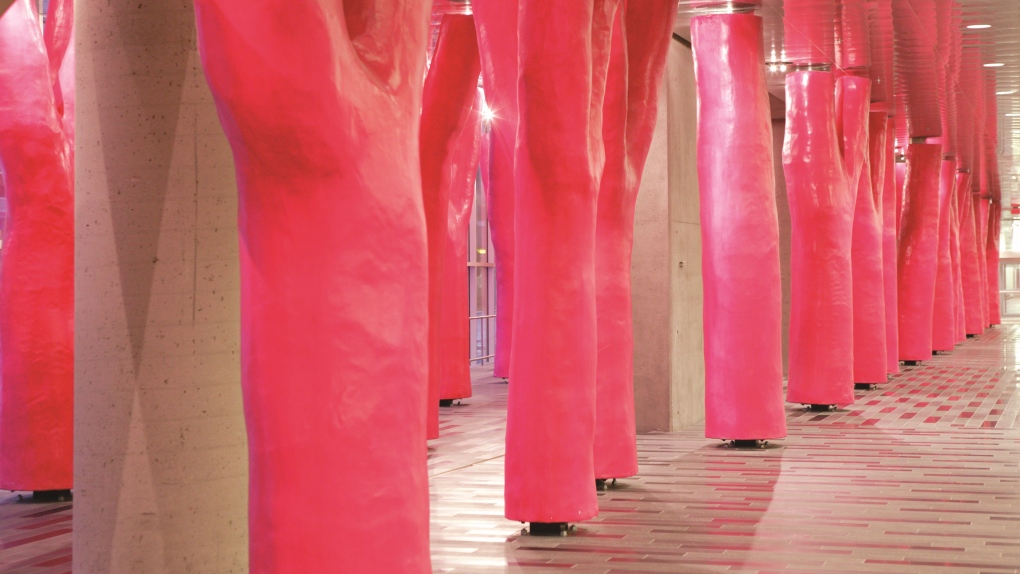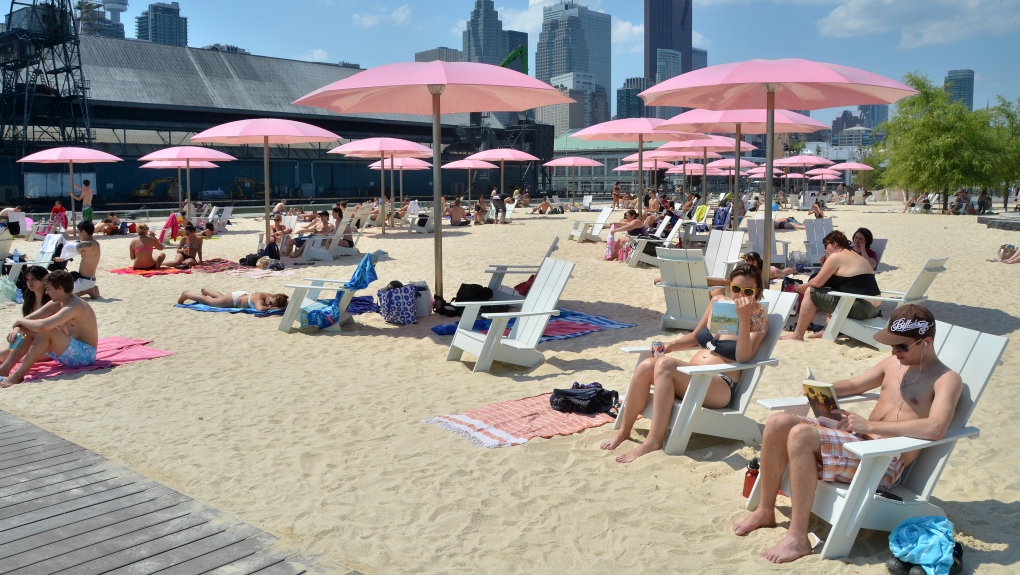Claude Cormier, landscape architect behind rainbow balls in Montreal's Village, dies at 63
Claude Cormier, Quebec's most renowned landscape architect whose projects have revitalized public spaces across North America, has died.
He was 63.
In Montreal, the award-winning architect was famously known for coating The Village in a beautiful rainbow display created by thousands of coloured balls. He designed the decorative balls — later dubbed 18 Shades of Gay — which were suspended over a 1-kilometre stretch of Ste-Catherine Street. They were meant to be installed for just one summer, but ended up staying there for seven years.
A spokesperson for the architecture firm he founded, CCxA, confirmed in a statement that Cormier died at his home in Montreal on Friday due to complications from Li-Fraumeni syndrome, a rare genetic condition that is associated with a heightened risk of developing several types of cancer.
In Montreal, his work can be seen in the zig-zag paths that cross through Place d'Youville in Old Montreal, Clock Tower Beach with its signature blue umbrellas on the city's waterfront, the 52 pink concrete trees that make up the Lipstick Forest, and the sliced-in-half water fountain that he designed in the rejuvenated Dorchester Square.
 18 Shades of Gay, designed by Claude Cormier, adorns Ste-Catherine Street in Montreal. (Source: Jean-Michael Seminaro)
18 Shades of Gay, designed by Claude Cormier, adorns Ste-Catherine Street in Montreal. (Source: Jean-Michael Seminaro)
 Dorchester Square in Montreal. (Source: JF Savaria)
Dorchester Square in Montreal. (Source: JF Savaria)
"Cormier’s joyful and subversive designs blended conceptual clarity with a studied instinct for making enduring places. His ability to design public spaces with broad public appeal stemmed from multiple qualities: audacity, sincerity, discipline, leadership, business acumen, a talent for creative problem solving, and an ability to bring light and laughter to everyone — and every situation — he encountered," reads an obituary published Friday.
 Clocktower Beach in Montreal. (Source: CCxA)
Clocktower Beach in Montreal. (Source: CCxA)
 Lipstick Forest in Montreal. (Source: Jean-Francois Vezina)
Lipstick Forest in Montreal. (Source: Jean-Francois Vezina)
Cormier, who studied history and theory of design at Harvard University, also was the brainchild of projects in Toronto, such as Sugar Beach and the city's Berczy Park — a project he faced criticism from bureaucrats for by incorporating life-sized bronze dog statues into the space.
 Berczy Park in Toronto. (Source: Industryous Photography)
Berczy Park in Toronto. (Source: Industryous Photography)
He has also been described as an "ambassador for queer issues" through his work.
"Whether conveyed through the pink columns of Lipstick Forest (2002), Sugar Beach’s signature pink umbrellas near the base of Toronto’s Gay Village, or the rainbow balls of Cormier’s brilliant Pink Balls (2011-2016) and 18 Shades of Gay (2017-2019) installations that hung over Montreal's Sainte-Catherine Street East every summer for nearly a decade, the expression of queer joy was an important dimension of Cormier’s design identity," the obituary reads.
 Sugar Beach in Toronto. (Source: Nicola Betts)
Sugar Beach in Toronto. (Source: Nicola Betts)
Montreal Mayor Valérie Plante said his death was "an immense loss," describing Cormier as "a visionary, a builder and a great Montrealer."
"His influence on the city's icons and public squares can be counted by the dozens: the Oval, Village Boules, Dorchester Square, Horloge Beach and more. His architectural work is a legacy that will live on in our memories forever," she wrote in a social media post on Friday.
"My sympathies to his family, loved ones and all those who mourn him today. Thank you for everything, Claude, and may you rest in peace."
Cormier grew up on a family farm run by his father, Laurent, in Princeville, Que., a town about 180 kilometres northeast of Montreal. His mother, Solange, was a teacher. In 2009, he received the Ordre National du Québec and has received more than 100 awards during his career as a landscape architect.
His last major projects were in the cities he loved most — Montreal and Toronto. The Ring, a massive, 30-metre-diameter steel loop, was inaugurated last year in Montreal's Place Ville Marie. Earlier this year, he unveiled a heart-shaped pond in Love Park in Toronto's downtown waterfront.
CANCER AFFLICTED HIS FAMILY
Cancer had struck the Cormier family particularly hard. The disease has taken the life of his sister at 53 in 2009, his father in 1976, and the lives of several aunts and uncles on his father's side.
About four years ago, Cormier was diagnosed with lung cancer, kidney cancer, as well as a rare form of lymphoma, according to his obituary.
The triple diagnosis led him to probe possible genetic origins of the rare condition he had. He later learned that several relatives on his father's side had been afflicted by Li-Fraumeni Syndrome.
Cormier is survived by his mother, sister, brother, nieces and nephew and several colleagues at CCxA.
CTVNews.ca Top Stories

LIVE UPDATES Latest info: FBI says the New Orleans truck attacker acted alone in an 'act of terrorism'
The FBI now says the New Orleans truck attacker acted alone in an 'act of terrorism' when he drove a pickup truck into a crowd of New Year's revellers early Wednesday, killing 14 people.
Possible scenarios that could play out in Ottawa as the Liberal government teeters
Prime Minister Justin Trudeau is said to be reflecting on his future over the holidays after the resignation of his top cabinet minister, Chrystia Freeland, in mid-December. The bombshell move prompted a fresh wave of calls for Trudeau to step down as Liberal leader from inside and outside the caucus.
Woman, father killed on New Year's Eve were victims of intimate partner violence: Halifax police
Halifax police are investigating three deaths that are connected – two of which they say were homicides resulting from intimate partner violence – in the city on New Year’s Eve.
Man who died in Tesla Cybertruck explosion was active-duty U.S. army soldier, officials say
The person who authorities believe died in the explosion of a Tesla Cybertruck packed with firework mortars and camp fuel canisters outside U.S. president-elect Donald Trump's Las Vegas hotel was an active-duty U.S. Army soldier, three U.S. officials told The Associated Press on Thursday.
FORECAST Weather warnings issued in 6 provinces and territories
Wintry weather conditions, including heavy snow and wind chill values around -55, prompted warnings in six provinces and territories early Thursday morning.
Sask. RCMP locate missing inmate of Yorkton prison
An inmate who was wanted for being unlawfully-at-large after not returning to Whitespruce Provincial Training Centre in Yorkton has been found and arrested.
5 things we know and still don't know about COVID, 5 years after it appeared
The virus is still with us, though humanity has built up immunity through vaccinations and infections. It's less deadly than it was in the pandemic's early days and it no longer tops the list of leading causes of death. But the virus is evolving, meaning scientists must track it closely.
Who are Canada's top-earning CEOs and how much do they make?
Canada's 100 highest-paid CEOs earned $13.2 million on average in 2023 from salaries, bonuses and other compensation, according to the Canadian Centre for Policy Alternatives.
More Popsicles, please: Your tonsils can grow back
Tonsil regrowth is rare. Here's one woman's experience when she had to get her tonsils removed – again.


































